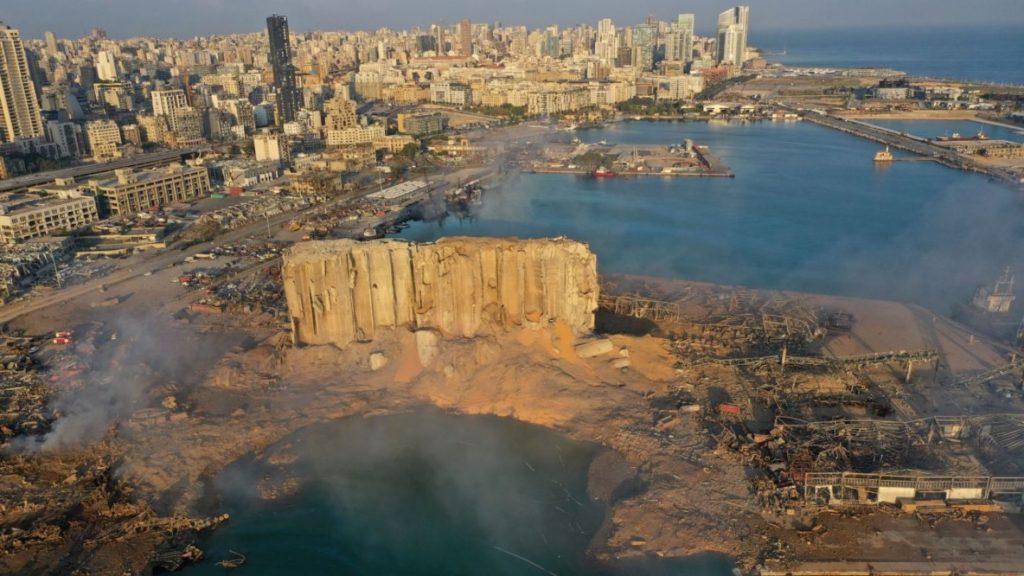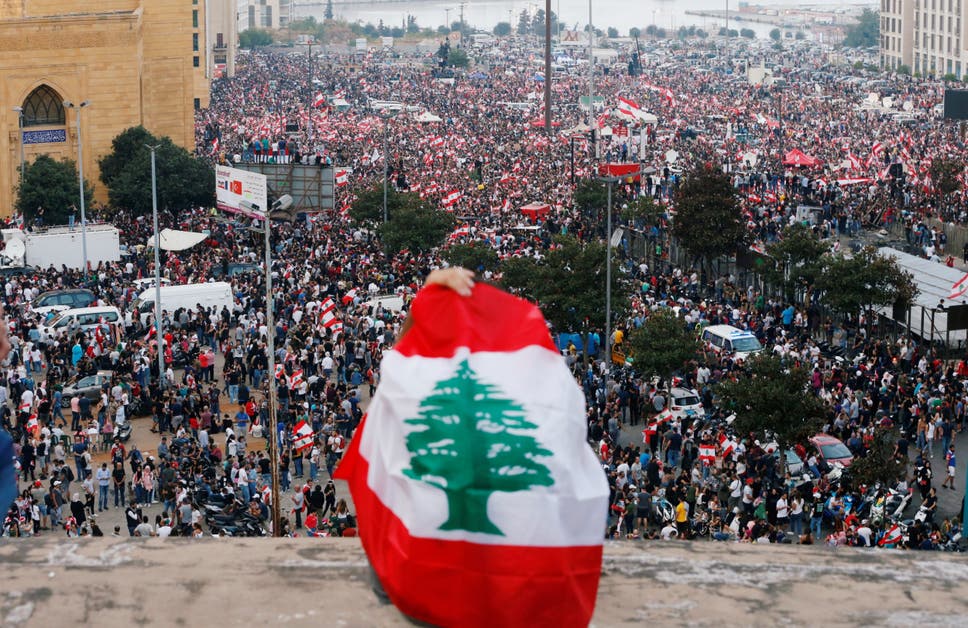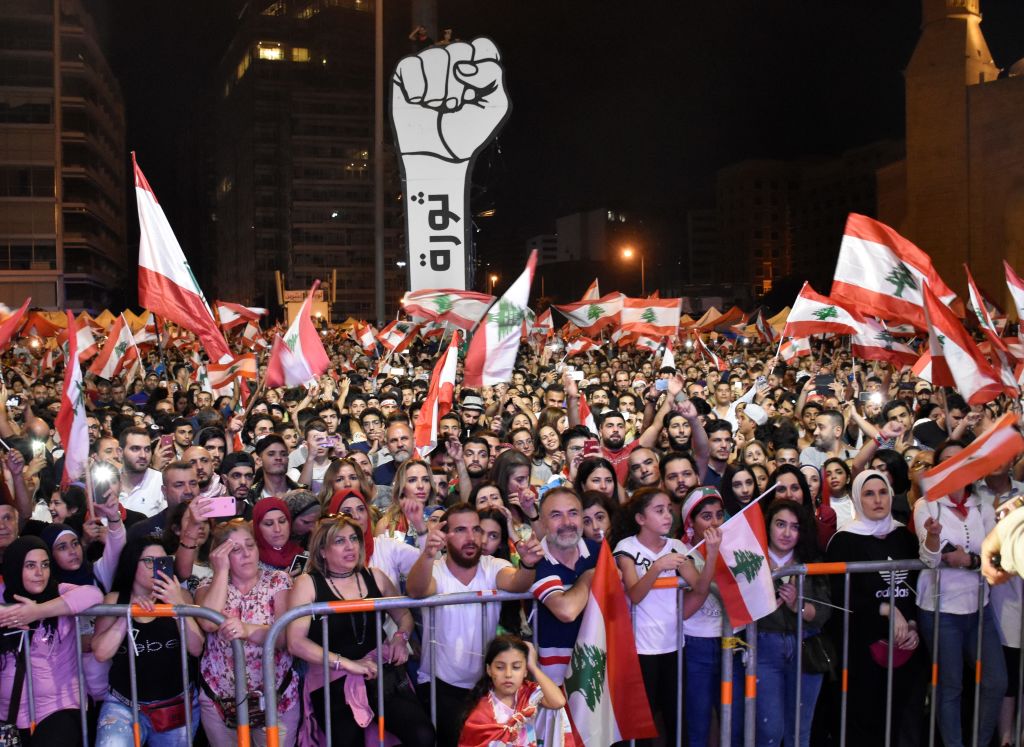By Jackie Abramian

“We are totally devastated-there’s so much pain. What we lived through is like watching a movie,” says peace builder, Shirine Jurdi a day after the August 4th explosion at the Beirut port. Suffering from ringing in her ears, her traumatized 15-year-old niece who had run off to the streets in horror, could not speak.
Nearly 200 are dead, 5,000 injured, unknown numbers missing, 300,000 displaced and homeless and Beirut’s institutions, restaurants and hospitals are partially or fully destroyed. The destruction, estimated between $5 to $15 billion, is a catastrophe for an already collapsing country. The Health Ministry has offered free hospitalization and medical care.
For the last six years, the Consul of Ministers, security sector and judicial authorities, aware of the dangerous chemicals stored at the port, took no preemptive measures to prevent a catastrophic accident in the densely populated capital city with over one million population. The 2,750 tons of ammonium nitrate containing 43.7 percent nitrogen is in violation of the law permitting only 11 percent–and if the government had a prioritized memo on the product’s dangers, why didn’t anyone take action? Was the fire because of mismanagement, or a foreign attack?
“The civil defense were the first victims. Why didn’t authorities evacuate nearby residents, stop traffic in both directions of the highway near the port?” Judi says lives could’ve been saved–like the five-year-old Alexandrea who was playing at home, Sahar Habib who was in the civil defense team, or those who died in their cars, homes or at their workplace. External attack or an internal negligence, Jurdi wants accountability.
Satellite imagery of the #Beirut explosion.#LebanonExplosion pic.twitter.com/1z0XQ9UEPH
— better world (@betterw13983104) August 18, 2020
Alarmingly, on August 6th, humanitarian activist Muna Luqman called on The UN Security Council to take urgent measures regarding the Safer oil tanker in Yemen. She warned of an imminent disaster in the Red Sea that may be much worse than the Beirut port and nearly four times the Exxon Valdez Alaska oil spill.
“We must raise Responsibility to Protect as a norm agreed at the UN since 2005, mandating that the sovereignty of the state is not a privilege but a responsibility,” Jurdi explains if the State was unwilling or unable to do so, the responsibility shifted to the international community to use diplomatic, humanitarian and other means to protect them. “Once we look at the details in Lebanon, we know we face crimes against humanity and R2P must apply.”
Jurdi who volunteers as executive member of the Women’s International League for Peace and Freedom( WILPF) Lebanon Section and the International Board MENA Regional Representative, is a Stop Killer Robots Campaign Team leader in Lebanon, and part of the Permanent Peace Movement (PPM) Secretariat MENAPPAC, Regional Liaison Officer of the Global Partnership for the Prevention of Armed Conflict GPPAC. Jurdi urges the international community to operate as a crises management plan to meet the needs of the injured, recover the destroyed hospitals, search for the missing, provide the displaced with housing, food and basic needs, and conduct a transparent, independent and comprehensive investigation.
Meanwhile Beirut residents are helping those in need, removing debris, providing food and shelter, and collecting names of the missing. While President Michel Aoun has yet to share the promised investigation results–the council of ministers resigned.
Lebanon’s Collapsing State Prior To The Catastrophic Explosion

“Every day there’s a new priority in Lebanon,” Jurdi says the 40 percent unemployment rate on the eve of the explosion has now reached nearly 65 percent.
A graduate of the Lebanese American University (LAU), the Tokyo University of Foreign Studies (TUFS), and a research fellow at SOAS, Jurdi’s peace-building work has focused on peace, social cohesion and equality. Taking a holistic approach to theory and practice, academic and grassroots activism, she fostered partnerships with various NGOs and INGOs to tackle the root causes of conflict towards achieving peace, including gender equity and equality. Her consultancy projects with the Ministry of the Return of the Displaced, UNODC, and as a researcher of Lebanese Heritage at LAU, earned Jurdi the 2019 International Young Women’s Peace and Human Rights Award from Democracy Today for “exceptional dedication and work on conflict prevention and protection of human rights”
Blaming Lebanon’s collapse on the lack of establishing statehood without creating institutions at the base, Jurdi says a vicious circle of religious and political fiefdoms ensued a “political confessionalism” in the religiously, culturally and politically diverse country. With no unified national identity, Lebanon is defined by six Muslim (Shi’a, Sunni, Druze, Isma’ili, Alawite or Nusayri), and 12 Christian (Maronite Catholic, Greek Orthodox, Melkite Catholic, Armenian Orthodox, Syrian Catholic, Armenian Catholic, Syrian Orthodox, Roman Catholic, Chaldean, Assyrian, Copt, Protestant) sects. This montage of religious and political allegiance is balanced by distributing parliamentary, governmental, public service and institutional positions in proportion to the religious populations. India, Spain, Switzerland and Belgium have relative success under a similar system.
The 2019 “October Revolution”– triggered by taxes on gasoline, tobacco and $6 tax on free VoIP services as WhatsApp–led hundreds of thousands demanding justice and the resignation of corrupt politicians. For nearly 300 days, protests rocketed Lebanon into a socio-political crisis. When Prime Minister Saad Hariri resigned, vice president of the American University of Beirut, Hassan Diab, replaced him and resigned in August 2020 following the explosion in Beirut.
“The unjust political confessional system leads politicians to power-share amongst themselves robbing the vast majority of the population of their rights,” while Lebanon’s democracy avails space to freely voice defiance, Jurdi says each community defends its own political and religious leader’s interest. “Ultimately, with a social structure that’s based on corruption, each community’s survival depends on their own resources.”
Warlords-turned politicians maintain strongholds within their communities, turning the “state into a camouflage shadow.” For the last 30 years, the international community and the World Bank funded Lebanon’s post-civil war reconstruction efforts, without accountability of transitional or restorative justice. James Rickards of CEFP Board of Advisors explains how in March 2020 Lebanon “with its economy in a tailspin…. missed a payment on a $1.2 billion Eurobond…. and defaulted on all outstanding eurobond obligations, including an additional $2.7 billion of payments due in April and June.”
“We lost trust in our banks for not sharing their lack of cash fluidity with the masses,” Jurdi says the banks lent all the deposits to the central bank which lent it to the Lebanese government, which is incapable of repaying. The exchange rate of 1,500 Lira to a US dollar in banks increases to 3,800 to 10,000 Liras in currency exchange shops or the black-market.
The Seeds Of The October Revolution

“How can old warring militia leaders take leadership roles? Those who make war can’t make peace,” Jurdi argues how the collapsing economy’s ecosystem of corruption and nepotism determined who got a job, an education, healthcare and hospitalization, utilities, sanitation and more.
During 2019, the alayesh moshtarak–co-existence–motto united communities across socio-economic and religious divides–while politicians, Jurdi says, want the country divided for better control. Lebanon’s political decisions–supported by the American, Iranian and Saudi factors–has been knee-jerk pronouncements to benefit one sect, not the entire country. Compounding Lebanon’s economy is a threatened tourism jeopardized by regular Israeli attacks across the southern border.
“The hypocrisy of denial and analysis led to the collapse of everything around us. Nothing is working except people–we help each other as we live through two hours of electricity per day, as fuel ‘disappears’ with the minister of energy belittling our intelligence,” Jurdi is angry that while Lebanese starve, banks stand empty of currency, political parties benefit their own community. “Conditional experts catering only to their community’s needs.”
The revolutionaries are working to develop a civil secular political system based on human rights approach–separation of powers, especially judicial to achieve transparency and accountability for those who have ruled since the end of the civil war. A system with a real, substantive and meaningful representation of the people.
FORBES


Leave a Reply
You must be logged in to post a comment.